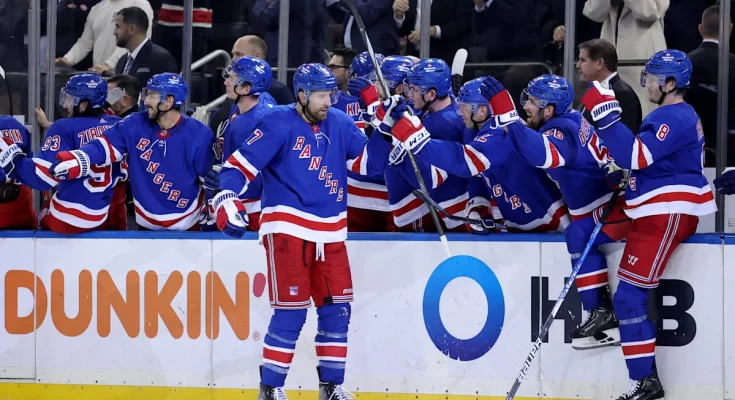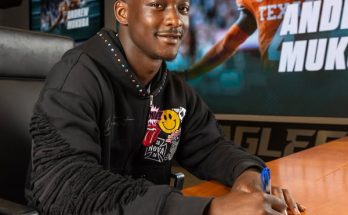Blake Wheeler’s career came to a quiet but deeply meaningful close, a departure that reverberated across the NHL as teams gear up for yet another whirlwind of off-season maneuvering. For over a decade and a half, Wheeler’s presence loomed large—on the ice, in locker rooms, and across the hockey community. His retirement marks the end of a formidable era, but the headlines didn’t stop there. As the veteran forward bids farewell, the New York Rangers have been thrown into the spotlight once again, this time as serious contenders in the chase for a potentially game-changing trade acquisition. The two events may seem unconnected at first glance, but they share the common thread of timing, leadership, and franchise direction. Wheeler’s departure invites reflection on what teams gain and lose when a respected veteran exits, while the Rangers’ current ambitions signal the strategic hunger of a team determined not to let championship windows close quietly.
Wheeler’s journey through the NHL is a case study in resilience, adaptability, and leadership. Drafted fifth overall in 2004 by the Phoenix Coyotes, his career didn’t unfold in typical top-five fashion. He never played a game for the Coyotes, eventually signing with the Boston Bruins in 2008 after a collegiate career at the University of Minnesota. From there, he moved to the Atlanta Thrashers—who would later become the Winnipeg Jets—where he blossomed into one of the league’s most reliable two-way forwards and eventually took on the captaincy. Wheeler’s combination of size, speed, vision, and hockey IQ helped define the identity of the modern Jets. As Winnipeg’s captain, he played through injuries, off-ice scrutiny, and coaching transitions, never once losing the locker room or letting personal setbacks interfere with team cohesion. His leadership style, often marked by candor and introspection, gave teammates room to grow while upholding accountability. That balance is a rare quality in professional sports, and Wheeler’s presence will be missed in more ways than the stat sheet can quantify.
His final season with the New York Rangers—though modest in production—showed flashes of the same poise and veteran steadiness that had defined his prime years. He was not the star of the show, not even close, but he was the kind of player who anchored line changes, mentored younger players, and maintained composure during high-pressure moments. His influence extended beyond his ice time. Younger Rangers players credited Wheeler with easing the transition into one of hockey’s most scrutinized markets. Though his scoring touch wasn’t what it once was, Wheeler’s voice in the locker room still mattered. With his retirement, the Rangers lose more than just a depth forward—they lose a calming voice and an emotional anchor, especially as the team prepares to make big roster decisions in pursuit of the Stanley Cup.
And that brings us to the second jolt in the hockey world: the Rangers, who now find themselves firmly in the thick of trade speculation involving a top-line talent. Sources close to the organization indicate that New York has been in active discussions with multiple teams regarding a high-impact player that could shift the dynamic of their forward group. While the name of the trade target has yet to be made public, insiders suggest that it’s a top-six forward with proven playoff experience and a high hockey IQ—attributes that would help offset Wheeler’s departure while enhancing the team’s offensive firepower. The timing is no coincidence. With Wheeler stepping away, the Rangers gain not just a locker-room vacancy, but also some cap flexibility and positional need that they seem determined to address sooner rather than later.
This surge of trade activity underscores New York’s aggressive posture heading into the 2025-26 season. After another disappointing playoff exit, team brass made it clear that mere competence wasn’t going to be enough. General Manager Chris Drury has already hinted that no player outside of the core is untouchable. The team has also explored packaging mid-tier players and prospects to upgrade its top two lines. The Rangers’ fan base, starved for a Cup run and wary of repeated postseason letdowns, appears to support the front office’s go-for-broke mentality. It’s a delicate dance between bold ambition and reckless risk, but the Rangers believe they’re closer to contention than their rivals think.
Wheeler’s retirement may have closed one chapter, but it arguably added urgency to the next. In many ways, his brief but impactful stint with the team set a standard for maturity and preparation that the next wave of Rangers players is expected to inherit. It also serves as a subtle warning that windows close quickly in this league. At 37, Wheeler knew his time was running out. For the Rangers, the core led by players like Artemi Panarin, Chris Kreider, and Adam Fox isn’t getting any younger either. That may explain the current flurry of trade discussions behind the scenes.
One rumor that refuses to die is the Rangers’ interest in bringing in a power forward who can create chaos in the offensive zone while still playing responsible hockey. Such a player would not only bolster their depth but also better align with head coach Peter Laviolette’s system, which thrives on aggression, quick transitions, and forechecking pressure. The Rangers have lacked a true net-front presence in key playoff moments, and it’s a void that a potential trade target could immediately address. While names like Lawson Crouse, Travis Konecny, and even Brock Boeser have floated around the NHL grapevine, the Rangers are keeping their cards close to the chest. What’s evident, however, is their intention: to make a big move, not just a symbolic one.
This kind of dual storyline—an iconic veteran bowing out and a team recalibrating with urgency—is part of what makes hockey so compelling. Wheeler’s departure is being met with the somber respect due to a player of his caliber, but it also magnifies the stakes for the Rangers. They don’t have the luxury of sentimentality right now. They are trying to win. And to win, they must evolve.
Leadership transitions are never easy, and replacing what Wheeler brought to the team’s culture can’t be done via trade alone. It’s about finding players who understand what it takes to manage the grind of an 82-game season, the pressure of playing under the MSG lights, and the gauntlet of the Eastern Conference playoffs. That kind of intangibility is rare, and it’s likely part of why the Rangers are so focused on acquiring someone with both skill and gravitas. The Wheeler era—short-lived as it was—served as a reminder of what that type of presence looks like.
As the off-season stretches on, all eyes are on the Rangers’ front office. Do they push in more chips for a player they believe can elevate them to Cup contention? Or do they risk another season of “what-ifs” and missed opportunities? With Blake Wheeler’s retirement giving the organization both reflection and financial wiggle room, it feels like the answer is already in motion. The Rangers aren’t just looking for a name—they’re looking for a difference-maker.
What makes this particular moment so fascinating is how seamless the transition from tribute to transaction has been. It speaks to the NHL’s brutal reality—honor and legacy matter, but timing and tactics rule the day. Wheeler may now be officially retired, but his influence continues to echo in the Rangers’ locker room, in their front office decisions, and in the DNA of a team still in pursuit of greatness. His exit may have created a void, but it also clarified what needs to come next.
In that clarity, the Rangers appear emboldened, ready to make noise, and perhaps, finally, ready to break through. Whether or not their bold gamble pays off remains to be seen, but in true New York fashion, they’re making sure no one can ignore them. Wheeler walks away from the game on his terms, while the Rangers move full speed ahead toward a future they’re determined to define on theirs. The torch has been passed. What the Rangers do with it will define their legacy.



